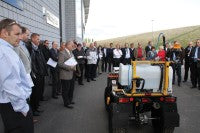EU Pesticide Directive Looms Large
 At a packed meeting of the Amenity Forum group at Doncaster's Keepmoat Stadium, attended by numerous representatives of the pesticide trade, plus a good attendance of local authority and other interested parties on 6th October, the looming EU Sustainable Use of Pesticides Directive (2009/128/EC) was outlined.
At a packed meeting of the Amenity Forum group at Doncaster's Keepmoat Stadium, attended by numerous representatives of the pesticide trade, plus a good attendance of local authority and other interested parties on 6th October, the looming EU Sustainable Use of Pesticides Directive (2009/128/EC) was outlined.
Adrian Dixon, head of the Chemical Regulation Directorate, Health and Safety Executive, was able to indicate how the new legislation is taking shape following past and ongoing consultations with the public, the industry and other interested parties.
No single piece of legislation will have a more far-reaching impact on all aspects of the use of pesticides, especially in the realms of public spaces, than this and it is due to come into law in November 2011, just over twelve months from now!
What will it mean in practical terms? The already limited use of pesticides will be even further restricted, with products that represent any threat to the environment or health being withdrawn or severely limited in use. It is likely that we will be left with only one or two of the very safest products for use in total weed control on hard surfaces. It is also likely that the use of these will be restricted to just one or two applications a year, and current application rates of these products will be greatly reduced, possibly to as little as one or two litres per hectare. Spot spraying of weeds will replace blanket applications of herbicide.
An Integrated Pest Management (IPM) approach will be high on the agenda, and other methods of weed control, such as sweeping, weed wiping, weed burners etc., being used in sensitive areas such as schools, hospitals or water catchment areas. The use of spraying equipment will very likely be restricted, as is already the case in Holland and Germany, to new technology that can apply extremely low doses of herbicide, targeted at weeds only and which eliminate the risk of any spray drift, as occurs with conventional hydraulic spraying equipment.
The Mankar Ultra Low Volume spraying system from Germany, the Weed-it spot spraying system with weed sensors, the Roto-Fix Weed Wiper system, which applies zero herbicide to the ground, only to emergent weed foliage, are likely to become specified, especially on hard surfaces in public areas. Greater weed presence will become accepted.
Paul Singleton, from Basis, outlined other far-reaching changes that will affect pesticide sales and advisory staff, who must keep up a programme of continuous professional education, monitored by BASIS, in order to continue to practice. This same concept will, for the first time, be extended to the many thousands of sprayer operators employed by councils, contractors and others, who will lose their right to apply pesticides if they do not keep up an ongoing training programme. Grandfather rights to operate will end.
Spraying equipment will be subject to a regular independent inspection, much like an MoT test, initially once every five years but probably falling to every three years. Operators will be expected to regularly check sprayer calibration and condition, to ensure that regulated doses of pesticide are not exceeded.
What is clear from all this is that the traditional practices of high volume blanket spraying of large urban areas, using traditional spraying equipment, will come to an end.
Are we all ready for the sea change that is about to hit us next year? I rather doubt it!
